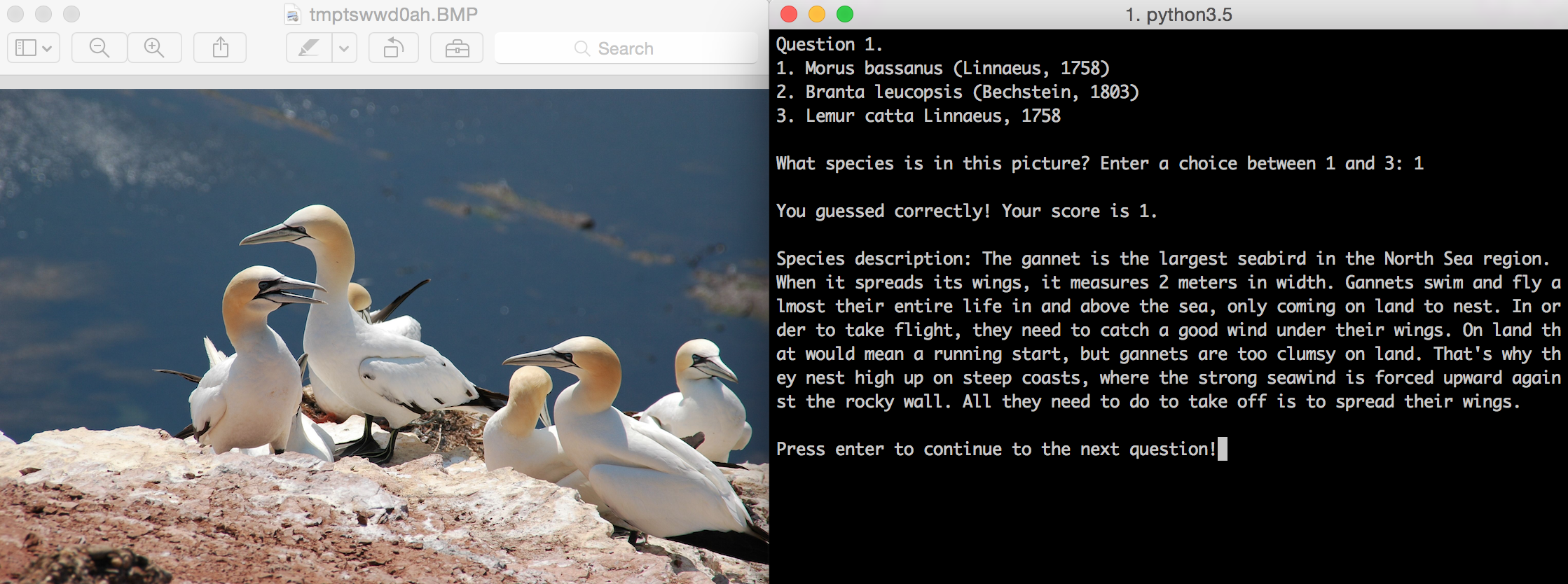planigale
Planigale is a game that challenges you to match the picture of the species with its Latin name.
Available as a web app and on the command line.
Data for Planigale were taken from the Encyclopedia of Life, a repository of all the species known to mankind.
Many cute! Much fun!
Command line version
Planigale was originally built for the command line. If you want to play, planigale works from version 1.0, but the latest version also works on command line.
Dependencies
-
Python 3
-
Install the following non built-in libraries using pip:
pillowfor image processingjsonpicklefor object serialization to json
You can install library dependencies using
pip install -r requirements.txt(this will also install dependencies for web planiagle as well)
Usage
- clone this repo to your computer
cdto the planigale directory in the terminal- run
python planigale.py
Web app
Planigale was a full-stack learning experience. We refactored the command line game into a Flask app, designed the front-end from scratch, hosted it on Heroku and stored the gameplay state in Redis.
Dependancies
- Python 3.5.0
- In addition to the libraries used for the command line version above, install the following non-built-in libraries using pip:
flaskis a micro web framework which makes it easy to create web applications.redisis a Python interface to the popular key-value store which is super fast and easy to set up. We used this to implement server-side sessions.gunicornis a WSGI container which is required for hosting this app in a production environment.
Usage
Before running planigale on a local (or remote) host, you must configure two environment variables. Instructions to set environment variables vary based upon your OS and platform.
REDIS_URLmust be set to the URL of the Redis instance which is being used for hosting the app. We used a free Redis to Go instance from heroku.PLANIGALE_KEYmust be set to a random value to ensure consistent client side sessions for flask here for more info).
Local host
Follow the below instructions to run the planigale web application locally.
- clone this repo to your computer
cdto the planigale directory in terminal- install library dependencies using
pip install -r requirements.txt - Run..
python planigale_flask.pyfor flask server in debug mode OR..gunicorn planigale_flask:app --log-file=-for gunicorn server with WSGI logs displayed to console.
- open a web browser. planigale should be hosted at http://localhost:5000/
Remote Host
Heroku was used for hosting this flask app. There are some good instructions for getting started with Python on Heroku here. This repository already contains the required files for hosting this on heroku.
runtime.txtis required to specify the Python 3.5.0 runtime for the heroku build process.requirements.txtspecifies the library requirements for the heroku build process.Procfilespecifies the commands and processes which should be run after completing the heroku build process.
If you have the heroku toolbelt installed, you can run the application locally using these settings using the command heroku local from the planigale directory.

